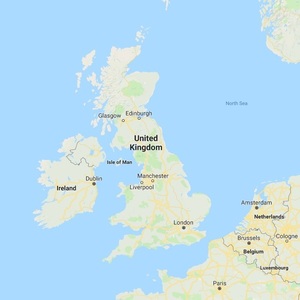UK launches public consultation on SAF revenue support scheme

SOURCE: Google Maps
March 5, 2025
BY Erin Krueger
The U.K. government on March 3 opened a public consultation on a sustainable aviation fuel (SAF) revenue certainty scheme, which aims to reduce financial risks for emerging SAF producers. The scheme complements the U.K.’s SAF mandate, which came into force Jan. 1, 2025.
The government is proposing the revenue certainty mechanism be funded by industry, preferably by introducing a levy on jet fuel suppliers. In addition to reducing risk for SAF producers, the revenue certainty scheme aims to limit costs and protect consumers from significant cost increases. The U.K. Department for Transport said any cost increases for consumers are expected to be inline with the usual variation of airline ticket prices.
Advertisement
The newly launched public consultation builds on the government’s response to an April 2024 consultation and the announcement of the SAF Revenue Support Mechanism Bill in a speech delivered by King Charles in mid-2024.
Before introducing legislation to create the SAF revenue support scheme, U.K. lawmakers need to have a clear plan on how to implement the subsidy. The public consultation outlines the government’s preferred approach to funding the revenue certainty mechanism and invites comments from stakeholders on that proposal, along with additional comments on how the mechanism could be funded and funding mechanism and design issues not addressed in its 2024 public consultation.
Under the government’s preferred approach, the aviation industry would fund the revenue certainty mechanism via a levy to cover the cost of payments to SAF producers and the cost of administering the scheme. This is consistent with existing schemes that support renewable electricity production and hydrogen. The costs of the contracts and the total levy amount required would vary over time, and be linked to the changing price of U.K.-supplied non-HEFA SAF. The government said variations in the levy would likely be more significant and frequent in the early years of the scheme when limited volumes of SAF are less able to negate external shocks. The levy amount could be changed between the collections periods by collecting an interim levy based on forecasts and then allowing for a reconciliation period that would allow adjustments to be made based on actual data.
Advertisement
Prior to introducing regulations for the revenue certainty mechanism, the government plans to engage extensively with industry regarding details on how the levy will operate. This includes how the total amount and individual contributions are calculated; how the levy will be collected and enforced; and the determination obligated to aviation fuel suppliers.
The revenue certainty mechanism complements the U.K. SAF mandate, which came into force earlier this year. By law, SAF must now account for at least 2% of all jet fuel in flights taking off from the U.K. The mandate is set to expand to 10% in 2030 and 22% in 2040.
Comments on the SAF revenue certainty scheme can be filed with the U.K. government through March 31. Additional information is available on the U.K. Department for Transport website.
Related Stories
The U.S. Energy Information Administration maintained its forecast for 2025 and 2026 biodiesel, renewable diesel and sustainable aviation fuel (SAF) production in its latest Short-Term Energy Outlook, released July 8.
XCF Global Inc. on July 10 shared its strategic plan to invest close to $1 billion in developing a network of SAF production facilities, expanding its U.S. footprint, and advancing its international growth strategy.
U.S. fuel ethanol capacity fell slightly in April, while biodiesel and renewable diesel capacity held steady, according to data released by the U.S. EIA on June 30. Feedstock consumption was down when compared to the previous month.
XCF Global Inc. on July 8 provided a production update on its flagship New Rise Reno facility, underscoring that the plant has successfully produced SAF, renewable diesel, and renewable naphtha during its initial ramp-up.
The U.S. EPA on July 8 hosted virtual public hearing to gather input on the agency’s recently released proposed rule to set 2026 and 2027 RFS RVOs. Members of the biofuel industry were among those to offer testimony during the event.
Upcoming Events










